Social housing sector: Youth engagement
This study was commissioned by the Scottish Government in order to gain
a better understanding of the baseline of youth engagement in the Scottish
social housing sector.
7. Analysis
7.1 Young tenants in social housing
Of the 30 housing organisations who participated in the online survey, 29 responded to TIS confirming the number of their tenants aged 16-34.
6 respondents (21%) have 100 or less; 7 respondents (24%) have between 101-200; 1 respondent (3%) has between 201-300; and 10 respondents (35%) have more than 301. 5 respondents (17%) are unaware of the number of tenants aged 16-34.
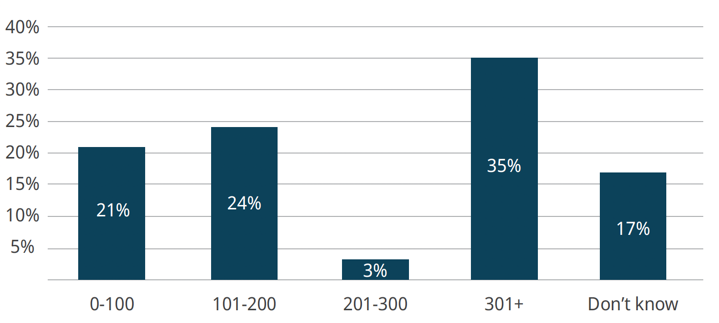
7.2 Participation options for young tenants
From the 30 respondents who participated in the online survey:
- 16 organisations (53%) identified that young tenants have responded to consultations, surveys and questionnaires;
- 12 organisations (40%) identified participation in public meetings, conferences and events;
- 6 organisations identified that young tenants have participated in focus groups and working groups;
- 4 organisations (13%) identified participation in tenant scrutiny groups; and
- 3 organisations (10%) identified participation in Registered Tenant Organisations (RTOs).
Please note: These figures include where young tenants are involved in more than one activity with the same housing organisation.
7.2.1 Although this study indicates that involvement of young tenants taking part in tenant participation opportunities is relatively low, it must also be highlighted that a number of housing organisations were unable to accurately answer questions focused on participation options available to young tenants.
This is as a result of their organisation not asking specifically about participant ages and the fact that opportunities to engage are promoted widely to all tenants - and not focused solely on one specific age range or other demographic. Of the 30 survey participants, 8 (27%) highlighted this key theme specifically. Comments included:
- No specific opportunities for young people - other than our menu of options available to all our tenants.
- Young people get the same opportunities as other tenants to become involved.
- No different – mainstream opportunities.
- We have not actively targeted young people.
- We do not target any specific work to young people. We work with our tenants, some of whom are young people - though the greater majority are older.
7.2.2 Positive practice: Participation options for young tenants
The examples of positive practice that follow, were highlighted by case study participants – specific to their efforts to increase tenant participation options for young tenants.
a) Queens Cross Housing Association has recruited a Tenant Participation Officer to focus specifically on engaging young tenants.
The team is also establishing a Young Person's Panel, and trailblazing a model for youth engagement, which will enable young tenants to have their say and inform housing and wider community services.
These efforts have resulted in the organisation as a whole becoming more aware and proactive in ensuring young tenants are involved in wider consultation and participation opportunities. The Association also highlighted the benefits of hosting Café Conversations as the relaxed and informal environment was successful in appealing to the young tenant demographic.
Having a Tenant Participation Officer with a focus on working with young tenants has been central to the success of this project. The young people involved have grown in confidence and skills, and their participation is shaping the Association's housing services.
b) Blochairn Housing Association recognises that young people are the future of the local community and need to be involved in the future development of the organisation.
Outreach work with young tenants has supported the organisation to understand their priorities, as well as identifying joint solutions to a local graffiti problem and antisocial behaviour. The outreach approach in engaging young tenants, and diversionary activities, has supported the young tenant demographic to feel more involved and included in their community, take ownership and recognise their impact on the local area.
One of the Association's members, previously involved in their youth activities, now sits on their Board. They have also incorporated a new corporate service officer to support the engagement of young tenants.
7.3 Working in partnership to engage young tenants
Of the 30 survey participants, 21 responded to the question of whether their housing organisation works in partnership with other organisations to engage and support young tenants. 8 (39%) responded "no".
13 (61%) responded "yes" and noted organisations such as: Scottish Youth Parliament; Young Scot; local youth councils and forums; local employment agencies; charities focused on young people; community volunteer services; and schools and colleges.
7.3.1 Feedback indicates that housing organisations who demonstrate higher levels of engagement with young tenants do so in partnership with wider community services, charities and voluntary organisations - and view this as an important and necessary part of successful youth engagement.
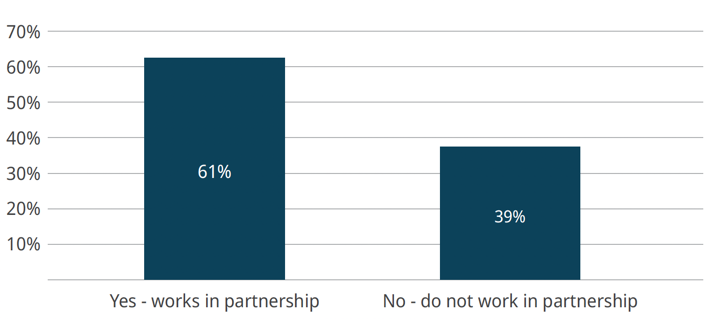
7.3.2 Positive practice: Working in partnership to engage young tenants
The following examples of positive practice were highlighted by case study participants – specific to their efforts to work in partnership with other organisations to engage and support young tenants.
a) Aberdeen City Council works in partnership with Aberdeen City Youth Council to further develop its Youth Housing Network activities. A notable achievement of this partnership is the development of a Youth Housing Survey which sought views on what is important to the younger generation when engaging in housing discussions; what their future priorities are; and what they want the future of their home to look like.
The survey was sent to every social housing tenant through the North East Tenants and Landlords Together (NETRALT) Network and included an incentive of six £50 prize draw vouchers for taking part. The survey received an impressive return of over 600 verified responses.
The Youth Housing Survey Results report is an authentic view of the opinions of young people across the city, presented to make an impact on services and the resources that young people are reliant on. The high response rate demonstrates that young people are interested in getting involved in housing matters when engaged effectively.
A key aim of the process was that the survey would be designed, distributed, compiled, and launched by young people for young people so that the captured views would be authentically represented. This initiative has provided Aberdeen City Council with useful information about young people's priorities and will help to shape future housing services.
b) Blochairn Housing Association works in partnership with Royston Youth Action (RYA) to support the involvement of young people in local, wider activities. The Association's Director is Chairperson of RYA's Board. Partnership working is a key component to encourage younger people to participate.
c) Fife Council has developed 'Ask the Cooncil' events, in partnership with Fife College Student Reps at several campuses across Fife, to increase awareness of housing and tenant participation opportunities, and to provide practical housing advice to young people.
The Council highlighted that the benefits of hosting these events in a casual, familiar setting included encouraging young people to feel relaxed in asking questions and taking part in conversations.
Tenant participation is embedded in the culture of Fife Council and having dedicated tenant participation staff in place has seen an increase in the number of tenants who are taking part and giving their views.
d) North Ayrshire Council's Housing Service works alongside the Council's Youth Services to promote housing information and participation opportunities and promoted housing service information via the Young Scot website. This has raised awareness about housing options amongst young people.
e) Falkirk Council developed its Room to Talk project following consultation with young people in partnership with the Community Learning and Development Service - where young people expressed to housing service staff that consultation with them should be in a relaxed environment that they were comfortable with.
Informal chats, completing surveys and sharing views take place in college foyers and local fast-food restaurants in exchange for a small reward - such as a burger and soft drink.
The Council received around 100 completed surveys and highlighted the benefits of offering an incentive to get involved, as tenants were inclined to give their views more freely after enjoying a meal or refreshments with staff, and building a rapport.
Room to Talk has provided an informal way for young people to get involved and to identify what is important to them and what they wish to see from future consultations. Consultation methods have been used that suit the needs of young people and this has encouraged greater involvement .This feedback has supported Falkirk Council to improve its housing service provision.
7.4 Access to training opportunities for young tenants
The online survey also explored training opportunities, provided by housing organisations, to develop the skills and knowledge of young tenants and to support them to enhance their employment prospects and support them to reach their full potential.
7.4.1 14 respondents (74%) have not provided training and support opportunities for young tenants specifically to support engagement practices. Where 5 respondents (26%) noted that they had, comments included:
- We have provided the staff youth connections group with training on tenant participation – and how they can enhance tenant participation in their role to engage young tenants.
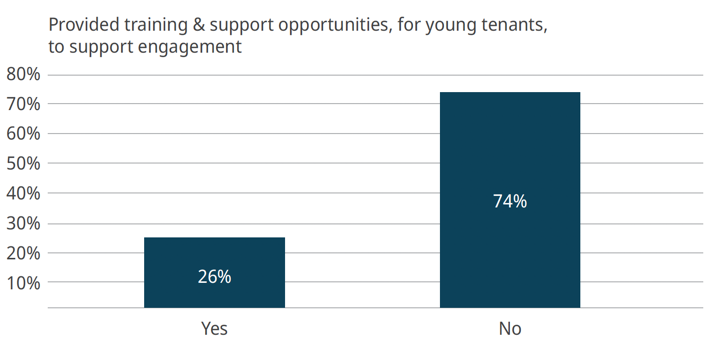
7.4.2 10 respondents (53%) have not provided training and support opportunities for young people to support capacity building in other areas. Where 9 respondents (47%) noted that they had, comments included:
- Personal development and community resilience is high on our group, and individual support programmes, as part of preparing young people for sustainable independent living.
- Via the community projects work we carry out - these are not targeted specifically at young people, but participants may include 16–34-year-olds.
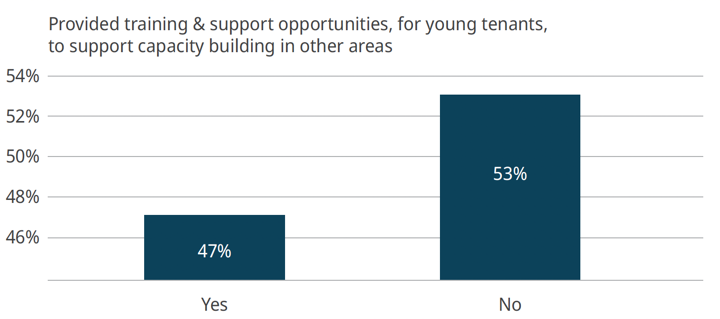
7.4.3 Whilst not a core tenant participation requirement, 13 respondents (68%) reported that they provide training and support opportunities for young people to access training and employment opportunities.
6 respondents (32%) have not provided training and support opportunities for young people to enable access to training and employment opportunities.
Positively, where 13 respondents (68%) noted that they had, comments included:
- We offer a training academy for all interested tenants - covering presentation skills, report writing, and confidence building.
- We make referrals onto our financial capability officer who deals with employability.
- We partner with local employability services, colleges, and employers to build pathways for young people into job readiness - and also into employment.
- The Association has provided training and employment opportunities in the construction industry as part of employability schemes linked to the development programme.
- CV writing and interview techniques.
7.4.4 Positive practice: Access to training opportunities for young tenants
The examples of positive practice below were highlighted by case study participants – specific to their efforts to provide training opportunities to support young tenants.
- a) Angus Council plans to develop and launch a housing options module for early school leavers, to support them to build their capacity and confidence through participation and engagement. This will support tenancy sustainment if they become a social housing tenant and enable them to learn valuable life experience.
- b) Eildon Housing Association engaged with school aged young people through its Community Benefits Officer role - including workshops in schools focused on the construction sector and producing art for a new development.
- c) North Ayrshire Council has a younger staff member working group (Youth Connections) in order to gain insight on young people's professional perspectives and provide tailored capacity building support to enable them to develop their personal and professional skill set.
7.5 The impact of Covid-19
The Covid-19 pandemic significantly changed the way that housing organisations engage with their tenants and other users of their landlord services. Traditional methods to get involved were enriched by new technologies, innovative practice and online communication tools to ensure communities stayed connected.
This study was keen to explore any challenges or opportunities - specific to engaging young tenants aged 16-34 - that may have emerged as a result of embracing digital engagement practices.
7.5.1 The 30 participants who took part in the initial online survey were invited to provide additional information focused on engaging young tenants via online participation methods. 14 housing organisations responded.
7.5.2 Although this study identifies that the pandemic naturally broadened the wider reach of engagement by offering more flexible choices to participate – it must also be noted that the majority of survey respondents (54%) did not evidence that the introduction of digital engagement had increased participation specifically for young tenants.
Respondents highlighted that this may be as a result of the ongoing challenge to engage young tenants generally across the Scottish social housing landscape:
- Opportunities have increased but the level of participation from young tenants has not increased - potentially due to limited engagement activities as a whole with young tenants.
- Digital engagement is now an option for all tenants, but no significant increase in young tenant involvement.
- Our approaches are more dynamic and inclusive; however, they are not returning great responses in terms of increased youth engagement or participation.
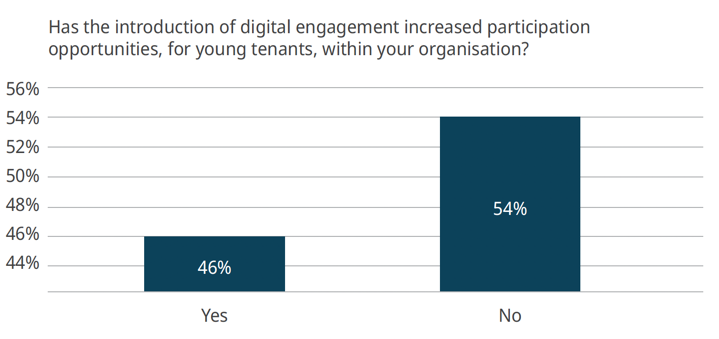
7.5.3 Equally, respondents raised the need to listen to the priorities of young tenants and engage in a way that they enjoy and feel most comfortable with:
- There is an assumption that youth engagement should focus on being delivered digitally - however we have found that young tenants want to meet face-to-face and be treated equally within their own environments.
- We were mindful of individual personal boundaries first and foremost. There is an assumption that the youth of today want to engage virtually, however we find this not to be the case. They are not forthcoming in our attempts at online engagement.
- We want our engagement to be representative of our tenants and not representative of who chooses to engage and participate.
7.5.4 Whilst the findings from this study reveal that the majority of housing organisations did not report increased youth engagement specifically as a result of providing digital participation opportunities – it must be recognised that positively, more flexible options for wider tenant engagement were developed.
Platforms that will continue to be utilised now and, in the future, include: social media, smart phone apps, e-bulletins, and virtual communication tools. Of the 14 survey participants, 11 (78%) highlighted this key theme specifically. Comments included:
- Trying new, various ways to engage including Near Me, texts, and email newsletters.
- The pandemic contributed to our acceleration of digital engagement opportunities. It also moved people to use digital methods and to get out of their comfort zones.
- There is still room to build upon the successes and positives from digital engagement.
- Digital engagement is now an option for all tenants.
- We are open to embracing new methods to engage.
7.4.4 Positive practice: The impact of Covid-19
The examples of positive practice below were highlighted by case study participants – specific to their efforts that may have emerged as a result of embracing digital engagement practices.
- a) Fife Council's Tenant Participation team has increased its use of social media platforms to engage all tenants - with uptake from younger tenants increasing and enabling officers to respond quickly.
- b) Angus Council were successful in funding 15 iPads and free internet for tenant representatives to engage with on their strategic delivery of housing. Two of these iPads were provided for two young tenants/households, pre-identified through local schools.
- c) Aberdeen City Council's work to engage and gather views of young people continued during lockdown, with the organisation adapting its operation from more traditional face-to-face methods to online virtual engagement. The shift to embracing digital and social media platforms enabled the organisation to broaden and widen its reach and engagement with young people. The survey work especially has been very positive, with increased response rates and wider promotion.
Contact
Email: TPAdminsupport@gov.scot
There is a problem
Thanks for your feedback